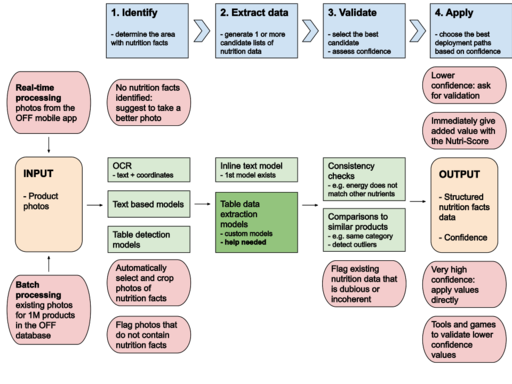Nutrition facts table data extraction: Difference between revisions
No edit summary |
|||
| Line 22: | Line 22: | ||
= How the model fits in the OFF infrastructure = | = How the model fits in the OFF infrastructure = | ||
[[File:Nutrition Facts extraction flow.svg]] | |||
[https://docs.google.com/drawings/d/1py3v_D1fba4jAl_Bj_SZkpupUH2aHfcGvBF_6eRjgpc/edit SVG source on Google Drawing] | |||
= Approaches = | = Approaches = | ||
Revision as of 13:51, 19 June 2020
Introduction
The Nutrition facts table data extraction project aims to automatically extract the nutrition facts values from photos of nutrition facts table.
Extracting nutritional facts from images would allow to fill values when nutritional facts are missing and to check values filled by users.
Why it's very important
- We need nutrition facts to compute nutritional quality with the Nutri-Score
- It takes 2 minutes per product to type in nutrition values, a process that is also tedious and error-prone
- 1M products x 2 minutes = 10 years of work full time without week-ends or vacations
- Being able to add complete data for a product quickly is key to attain a critical mass of products in new countries
Data, evaluation and test sets
Data sets
How the model fits in the OFF infrastructure
Approaches
Two approaches have been tested so far:
- Regexes used on the OCR output. A new /predict/nutrient endpoint has been added to Robotoff. This approach works best when nutritional information are not displayed in a table (“text” only).
- A clustering approach that tries to estimate the number of columns and lines of the nutritional tables using K-means or DBSCAN algorithms. Not integrated to Robotoff.
Previous attempts
- Scoring des méthodes de détection de tableaux nutritionnels PDF docx
- Analyse approfondie sur la détection
de tableaux nutritionnels pdf
- Table extraction (V1): https://github.com/openfoodfacts/off-nutrition-table-extractor
- Table extraction (v2): https://github.com/cgandon/openfoodfacts-nutriments
